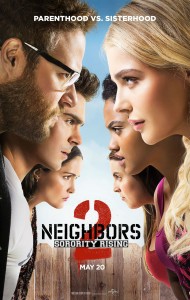SETH ROGEN, ZAC EFRON and ROSE BYRNE are joined by CHLOË GRACE MORETZ in Neighbors 2: Sorority Rising, the follow-up to the popular and original comedy of 2014.
Nicholas Stoller returns as director of a film that follows what happens when the spirit of parenthood goes against the bonds of sisterhood.
 Mac (Rogen) and Kelly Radner (Byrne), about to have a second baby, think they are ready to make the final move into adulthood–the suburbs. But just as they thought they’d reclaimed the neighborhood and were safe to sell, they learn that the new occupants next door are a sorority even more out of control than Teddy (Efron) and his brothers ever dreamed of being.
Mac (Rogen) and Kelly Radner (Byrne), about to have a second baby, think they are ready to make the final move into adulthood–the suburbs. But just as they thought they’d reclaimed the neighborhood and were safe to sell, they learn that the new occupants next door are a sorority even more out of control than Teddy (Efron) and his brothers ever dreamed of being.
Tired of their school’s sexist, restrictive system, the unorthodox ladies of Kappa Nu have decided to start a house where they can do whatever the hell they want. When Shelby (Moretz) and her sisters, Beth (KIERSEY CLEMONS) and Nora (BEANIE FELDSTEIN), find the perfect place just off campus, they won’t let the fact that it’s located on a quiet street stand in their way of parties as epic as the guys throw.
Forced to turn to the one ex-neighbor skilled to bring down the new Greeks next door, the Radners—and best friends Jimmy (IKE BARINHOLTZ) and Paula (CARLA GALLO)—bring in the charismatic Teddy (Efron) as their secret weapon. If he can infiltrate the sorority and charm his way through it, the thirtysomethings will shutter the Kappa’s home. But if they think that their neighbors are going down without a fight, they have underestimated the power of youthful ingenuity and straight-up craziness.
 Based on characters created by ANDREW JAY COHEN & BRENDAN O’BRIEN, Neighbors 2: Sorority Rising is written by Cohen & O’Brien & Stoller & Goldberg & Rogen.
Based on characters created by ANDREW JAY COHEN & BRENDAN O’BRIEN, Neighbors 2: Sorority Rising is written by Cohen & O’Brien & Stoller & Goldberg & Rogen.
Same Neighborhood, Nu Rules: Neighbors Returns
Released in 2014, the original comedy Neighbors struck a chord with audiences who enjoyed the film’s uproarious battle between a young couple and the fraternity that moved in next door. Naturally, the film’s hearty box-office and critical acclaim spawned discussions of a follow-up between its creators—director Nicholas Stoller and producers Seth Rogen, Evan Goldberg and James Weaver.
Determined not to suffer the same fate as the trite comedy sequels of the past—ones that ended up as overstuffed re-hashings of the originals—the team underscored that bigger doesn’t mean better. Comments Rogen, who stars in and produces the film: “The conversation wasn’t how to escalate it; that’s where a lot of sequels go wrong. It was how to evolve it. We weren’t trying to add more and make a bigger version of the first; we wanted to explore what the next thing was that would happen in these people’s lives.”
 In an effort to avoid the pitfalls and tropes of many sequels, the creative team extensively researched sequels they felt had parallel themes and found their greatest inspiration from a surprising source. Notes Stoller: “This is like a gross R-rated dirty disgusting Toy Story…but Toy Story nonetheless. It’s about growing up, getting older, and what is both funny and bittersweet about that process…and how it relates to every character in the movie.”
In an effort to avoid the pitfalls and tropes of many sequels, the creative team extensively researched sequels they felt had parallel themes and found their greatest inspiration from a surprising source. Notes Stoller: “This is like a gross R-rated dirty disgusting Toy Story…but Toy Story nonetheless. It’s about growing up, getting older, and what is both funny and bittersweet about that process…and how it relates to every character in the movie.”
A few years after taking down the frat that moved in next door, reformed partyers Mac and Kelly find themselves in a new phase of life. With baby no. 2 on the way, the couple is preparing to move their growing family out of the college town and head toward the last bastion of full-blown adulthood.
 Stella (ELISE VARGAS) is the phase in which toddlers discover the power of the word “no!”, Mac and Kelly are faced with the notion that their beautiful daughter will one day grow to become a rebellious teen and look at them with the same disdain for adults that they once did. Sums Stoller: “The film is about the terror and fear all parents feel that they are doing a bad job as parents and that one day their kid’s going to hate them.”
Stella (ELISE VARGAS) is the phase in which toddlers discover the power of the word “no!”, Mac and Kelly are faced with the notion that their beautiful daughter will one day grow to become a rebellious teen and look at them with the same disdain for adults that they once did. Sums Stoller: “The film is about the terror and fear all parents feel that they are doing a bad job as parents and that one day their kid’s going to hate them.”
It was this duality of purpose that appealed to the team. Says Rogen: “The first film dealt with not wanting to accept the idea of growing up and still having the desire to party and act immature. In this one, they’ve accepted that they’ve grown up, but don’t want to accept that their kids are going to grow up and dislike them. While the first one was about Mac and Kelly wanting to still be kids, this one is about them trying to control a kid.”
 For the Radners’ former neighbor, Teddy Sanders, time has proven to be somewhat unforgiving. After taking the fall for Delta Psi and his resulting expulsion, Teddy is stuck in a meaningless retail job without any sense of purpose or direction.
For the Radners’ former neighbor, Teddy Sanders, time has proven to be somewhat unforgiving. After taking the fall for Delta Psi and his resulting expulsion, Teddy is stuck in a meaningless retail job without any sense of purpose or direction.
With his frat buddies settling into their adult lives and establishing themselves both professionally and personally, Teddy is becoming increasingly aware that he might be left behind. “Teddy is in somewhat of a fragile state,” explains Efron. “He is on the brink of a new phase of life and is having a quarter-life crisis. All his old Delta Psi brothers have gone on and accomplished things, and he is stagnant and not progressing in the world.”
While Teddy is slowly unraveling and questioning how to put his very specific (and seemingly useless) skill set to good use, Mac and Kelly are preparing for their next big step. With a buyer locked in and the 30-day escrow period underway, lightning strikes again when a new tenant moves into the old Delta Psi house. Explains Rose Byrne: “Mac and Kelly are trying to move further into their domesticity; and lo and behold, a sorority moves in next door. They are faced with the possibility that they might lose both the house they’re selling and the house they bought, so the stakes are high.”
 The sorority serves as a cruel reminder of Mac and Kelly’s worst fear: the eventuality that their daughter will one day grow up to hate them. Explains Rogen: “We’ve accepted that we’ve grown up but don’t want to accept that our kids are going to grow up, start to dislike us and ultimately become the girls next door.”
The sorority serves as a cruel reminder of Mac and Kelly’s worst fear: the eventuality that their daughter will one day grow up to hate them. Explains Rogen: “We’ve accepted that we’ve grown up but don’t want to accept that our kids are going to grow up, start to dislike us and ultimately become the girls next door.”
While developing the project, numerous story ideas and scenarios were bandied about (Delta Psi returns years later! There’s a mythological party dorm called Dormopolis!), the creative team ultimately landed on the idea of a hard-partying sorority moving into the vacant house next door. It was then that they made a surprising discovery. “Someone in our office was in a sorority and overheard us talking about the idea of a hard-partying sorority moving in next door,” recalls Rogen. “She offhandedly mentioned that they actually aren’t allowed to throw parties. Once we looked it up, we found that it was true it gave us the idea for the whole storyline.”
Googling dug up the fact that Greek letter sororities are barred from serving alcohol at their residences. With the discovery of this glaring gender inequality, the filmmakers had stumbled on an interesting issue that broadened the scope of the Neighbors universe. “When we started researching how sororities work, we were shocked at how sexist the system was,” says Evan Goldberg. “Seth and I are from Canada and assumed that they threw parties just like the frats did. We knew that having a feminist undertone and storyline would make the movie a lot more interesting.”
 The girls arriving at the film’s college, Braxton, were ready to taste the storied college culture—away from the eyes of their parents and restrictions of high school life. Once they grasped the reality that they couldn’t throw-down as hard as the boys, they found an ideal worth fighting for. Any self-respecting girl has to fight for her right to party.
The girls arriving at the film’s college, Braxton, were ready to taste the storied college culture—away from the eyes of their parents and restrictions of high school life. Once they grasped the reality that they couldn’t throw-down as hard as the boys, they found an ideal worth fighting for. Any self-respecting girl has to fight for her right to party.
With one house desperate to make it through escrow and another desperate to start a legacy outside a male-oriented system, things escalate and Teddy is stuck in between. As the girls’ tactics get more and more ruthless, our hero is forced to choose between the Greeks and a system he once loved…or switch sides to bring the sorority down.
The creators of the first film’s characters, Andrew Jay Cohen & Brendan O’Brien, are joined by Rogen, Weaver and Stoller in screenplay duties on the second comedy. Together, they imagined Mac and Kelly going head to head with a group of empowered young women attempting to challenge a sexist system.
 The nobility of the sorority’s cause allows them to be more vicious and blurs the lines of just who the villains are. “The Kappa Nu girls have a much clearer vision and much more of a just goal this time around,” says Rogen. “It is said that the best villains are sympathetic. Because of that, the girls are able to go much further and are a lot scarier than the Delta Psi guys ever were.”
The nobility of the sorority’s cause allows them to be more vicious and blurs the lines of just who the villains are. “The Kappa Nu girls have a much clearer vision and much more of a just goal this time around,” says Rogen. “It is said that the best villains are sympathetic. Because of that, the girls are able to go much further and are a lot scarier than the Delta Psi guys ever were.”
As is true in times of war, ethics are put to the test when fighting for progress and change on the path to righteousness. States Stoller: “What the girls want to do is oddly a valiant and noble pursuit. So even as they’re being despicable to Mac and Kelly, you’re kind of rooting for them to succeed because they’re fighting the system.”
 It was crucial to the creative team that these be real characters, not just punchlines. The women of Kappa Nu are fighting for something they really believe in. The ideas explored through the scope of the characters address how women are usually portrayed in the genre, and this comedy does its part to level the playing field. In the Neighbors universe, the women are liberated and free enough to have fun at their own expense…just like the guys.
It was crucial to the creative team that these be real characters, not just punchlines. The women of Kappa Nu are fighting for something they really believe in. The ideas explored through the scope of the characters address how women are usually portrayed in the genre, and this comedy does its part to level the playing field. In the Neighbors universe, the women are liberated and free enough to have fun at their own expense…just like the guys.
“One of the running jokes in the movie is we have a lot of pretty dim-witted characters debating the rules of feminism,” says Stoller. “It’s kind of feminist to be able to act like an idiot, which is also a comment on how a lot of comedies don’t usually allow women to be idiots the way men are.”
Cast and Credits
Neighbors 2: Sorority Rising includes the return of a terrific supporting cast led by DAVE FRANCO, CHRISTOPHER MINTZ-PLASSE, and JERROD CARMICHAEL, as the brothers of Delta Psi, as well as featured favorite LISA KUDROW as Dean Carol Gladstone.
The filmmakers have assembled a behind-the-scenes crew of returning artists and those new to the company. They are led by cinematographer BRANDON TROST (This Is the End, The Interview), production designer THERESA GULESERIAN (Togetherness, Before We Go), editor ZENE BAKER (The Interview, This Is the End), costume designer LEESA EVANS (Zoolander 2, Trainwreck) and composer MICHAEL ANDREWS (Bridesmaids, Neighbors).
Also back in the same duties are producers EVAN GOLDBERG (This Is the End, The Interview), JAMES WEAVER (This Is the End, The Interview) and Rogen, who produce under their Point Grey Pictures banner.
Good Universe’s NATHAN KAHANE (Juno) and JOE DRAKE (The Hunger Games series) return to the series as executive producers alongside TED GIDLOW (The DUFF), Cohen and O’Brien.










